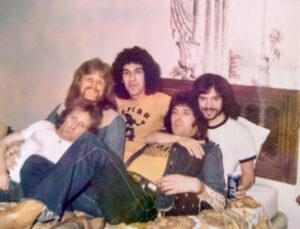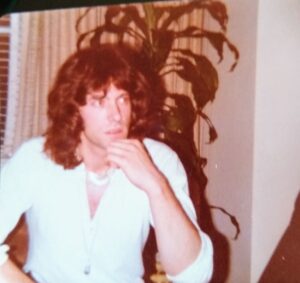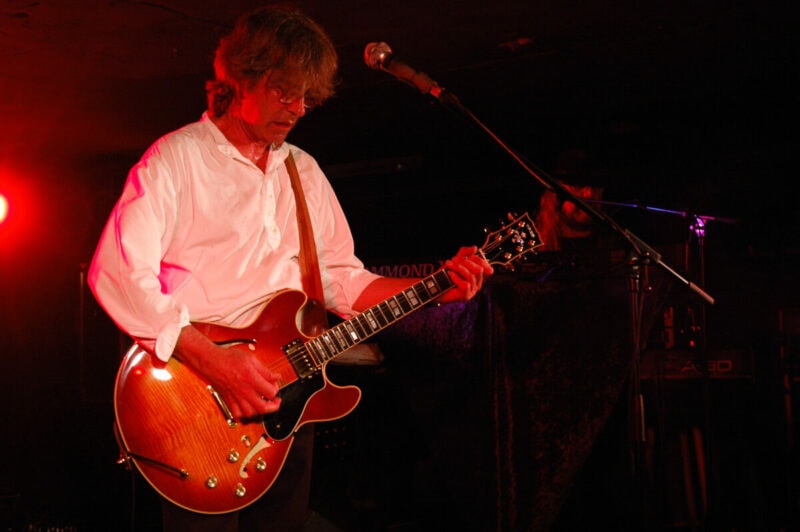[Editor’s Note: Ken previously wrote about progressive rock group Nektar in Issue 115 and Issue 116.]
By Nektar’s second American tour in 1975-76, Roye Albrighton (lead guitar player and singer) had stopped traveling with the band. He was instead traveling with his lover, a married woman who had an open relationship with her husband, Berndt. He made every gig and date and was never late. That was a huge relief, but how he traveled was unknown to me. In retrospect I find it interesting that we never ran into them or in any way crossed paths with them on that tour. Not at an airport, rental car site and only once at a hotel. The other band members included Allan “Taff” Freeman (keyboards), Derek “Mo” Moore (bass), Ron Howden (drums) and Mick Brockett (lighting and effects).
Berndt was supposedly a commercial media director in Germany. He was purportedly willing to go along with his wife’s affair and her interest in Roye’s career. To that extent he paid their expenses and furnished some financial support to Roye going forward.
It was also known to us, but not to the public, that at the end of the tour Roye would be leaving Nektar after some eight years and returning to Germany to start his solo career under the direction of Berndt. Still, Roye had a place in our hearts, and for me, I hoped his leaving was just talk. It was not, and at the end of the tour Roye and his lover returned to Germany.
 Photos of Roye Albrighton performing. Courtesy of Ken Sander.
Photos of Roye Albrighton performing. Courtesy of Ken Sander.
Nektar moved on and hired guitarist/vocalist David Nelson as Roye’s replacement. With the help of newly-hired music attorneys, Nektar sighed a new record contract with Polydor Records and the third American tour was booked by the late Jimmy Oppenheimer of Jeff Franklin’s American Talent International (ATI). The opening act was Lake, a German group who at the time had a somewhat successful debut album on the charts.
Having received a nice signing bonus from Polydor, Nektar upgraded their equipment and effects, which always included Mick Brockett’s dazzling light show. The third tour coincided with the release of Nektar’s then-new 1975 album Recycled.
Recycled did not do as well as expected and ticket sales on the tour suffered. There was friction with our opener, Lake, who seemed to be resentful of Nektar. When we were in Los Angeles, I was asked by ATI to take a meeting with their management representative, who was very cordial for a minute or so – and then suggested that Lake headline the rest of the tour and have Nektar as their opener. The money paid to each band would stay the same, he noted. I asked him what Nektar get out of that, and he said, “nothing. it is just that Lake’s album is doing better.” He thought reversing the billing was a good move (yeah, right, for Lake).
I was surprised and thought to myself that he had a hell of a nerve. Meeting over, he was insulted, like he was doing us a favor and I was not appreciating his effort. Jeez I thought, screw ’em. I never mentioned it to the band. I did not see the need to insult or upset them with this ridiculous request.
Derek “Mo” Moore, the de facto leader of Nektar, said to me after the tour that the choice of the album title Recycled might have been one of the reasons that the album did not sell well. He thought that people thought it might have been a compilation album, a greatest hits LP, with no new material.
 Ken Sander (yellow shirt) and Nektar enjoying a relaxing moment on the road on their first tour in Chicago.
Ken Sander (yellow shirt) and Nektar enjoying a relaxing moment on the road on their first tour in Chicago.Nektar went back into a recording studio in New Jersey to record their next album, and the owner of the studio convinced Mo that he would be a better manager than me. Mo approached me and we talked it out. Things were not in a good place for the band, and maybe new blood and money would be the change they needed. It was a friendly separation. To this day we are best friends. In fact Mo is one of my oldest friends.
I moved forward and toured with other bands. Then in 1978, Mo quit Nektar, and I assume Roye and those invovled came to an arrangement regarding performing rights for Nektar.
Soon after Roye gets in touch with me. He is living in New Jersey and wants to play, and could I book some gigs? He had Berndt call me, and we worked out a deal where he would guarantee any out-of-pocket expenses that were incurred, and I could commission the dates. We would work together so I agreed, even though I did not have a contract, but I naively assumed that if I booked the dates and was successful I would be in a strong position.
With no new product the only thing the band has going for it was name recognition. That has some value; I needed to build on it. It was not easy, but I kept at it. Finally, I book a date, but it is a week and a half away. People need to eat so I pay the band and crew out of my pocket.
The next Saturday “Roye Albrighton’s Nektar” plays the gig at The Chance, a rock club in Poughkeepsie, New York. The door (box office) is good and the club is happy. Roye’s Nektar plays well, so both the audience and band are happy. Next week I book dates in Pennsylvania and New Jersey. Then for the week after I nail down a Saturday in New York, plus gigs in DC and West Orange, NJ. OK, I am thinking; maybe, just maybe, there is a chance.
Then it turns out that Roye must leave the house where he is staying. He has nowhere to go. I ask Jessica, my then-wife, if he could stay with us, temporarily. “Where,” she asks. We have a small convertible couch in Josh’s bedroom. Josh is our infant son, only six months old. Jessica is hesitant and I ask her to bear with me and give it a try. I tell Roye he can stay in Josh’s room, but if he disturbs Josh or causes any issues, we will have to find another solution. Roye agrees and moves in.
Jessica and I brace for the worst, but it turns out that Roye is an excellent guest. He had his own key and came and went at will and not once did he even cause a ripple in the household. My our son never had an issue with his roommate. Roye was so quiet he never woke Josh or either of us and even if he did come home at odd times of the day or night, I never even heard the key turning in the door. The room and adjoining bathroom were always clean. Jessica and I were pleasantly surprised. After three or four weeks Roye found a new place and moved out.
The bookings were going well and Roye Albrighton’s Nektar was playing a few gigs a week and had created enough income to cover expenses. Ticket sales were increasing and the positive word of mouth was spreading. There was even enough left over that I was able to partially reimburse myself for some of my earlier out-of-pocket expenses. The signs were pointing in the right direction and everyone was optimistic.
Then I heard from Berndt. He was pleased and thought out loud, “maybe the band should come back to Germany and go into the studio and do an album.” And possibly Roye might also work with some promising upcoming German bands.
Unbeknownst to me, he had already told Roye that this was the plan. He was flying over to have a meeting with me and the band. It was a fait accompli, but I think Berndt was concerned that I might try to block the move. I pointed out to him that the band had gained some real momentum, and it might be wise to keep our foot on the gas. No, he had other plans for Roye, but he would fly over, have a band meeting and reimburse me for the monies owed to me. When he landed he rented a car and we drove to this picnic meeting where everyone including me knew what was going to happen. Apparently, he just wanted my blessing (probably for Roye’s sake).

We had the meeting, all four minutes of it. When it was time to head back to the city I again asked for my money and he made a face and then hesitantly pulled out his check book and wrote the check. You would have thought it was going to kill him.
After that day I was done. I think – and this is only my opinion – but it seems to me that Berndt had it in for Roye. He held the purse strings, he called the shots and I am assuming he took on this endeavor to subtly sabotage Roye’s career. The fact is that he had no standing or experience in the music business; his cash infusion was the only reason for his existence in our world. The best I can say about him was that he took over Roye’s career management halfheartedly.
I have been told some years ago that he got in trouble with the German tax authorities and took off running. Last thing I heard was that no one has heard hide nor hair from him, but that was a while ago so he might or might not still be on the lam.
Roye took me out for a drink a few years later. He was sorry for what had happened and was no longer involved with Berndt. I accepted his apology; we had been though a lot together, life was difficult, and I am not one to hold a grudge.
We saw each other on occasion and then he moved back to England. Roye got married on May 31, 1986. Then I lost touch with Roye for a time. Lyn (Roye’s wife) recently told me that Roye worked for 13 years in the offshore oil and gas industry as a computer technician. He traveled all over the world. Egypt, Syria, Vietnam, Norway, Kazakhstan, many countries. He was usually gone for a few weeks at a time then home for a similar length of time. The work suited him fine, and he enjoyed the travel.
In those years he did not play much, only at home. When asked if he missed performing, he said he had become disillusioned with the music business.
He became ill in 1998 and needed a liver transplant. At that time, he was in his 10th month in Iran managing a small oil company. He went back to the UK and had the transplant operation in March 1999. He was under for two weeks! After he woke up, he announced he was going back to music. And for the next 16 or so years Roye was back on stage playing his music.
I had not spoken to him for a long time but we got back in touch via Facebook. We stayed in contact up to the time of his death in the summer of 2016 at the age of 67.
Roye was flawed like many of us, but was a talented musician, truly a diamond in the rough. Given another set of circumstances who knows what he would have accomplished musically. Even so, he lived one hell of a life.




